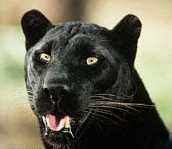
Report from Leo Martin
Deadly peril of wild cats living in our countryside
by John Maskey in The Express, January 6 th 1998
 For years people have laughed at stories of the Beast of Bodmin.
For years people have laughed at stories of the Beast of Bodmin.
Those who reported sighting of puma and leopards were often ridiculed and labelled as cranks.
But experts warned last night that hundreds of wild cats are roaming the British countryside - and they may have a taste for human flesh.
Zoologist Quentin Rose, who has investigated big cat sightings for six years said : 'People are going to be killed sooner or later. These animals can become man eaters.'
Over the past six years he has identified 27 reliable reports of leopards and 32 of puma, and 18 smaller members of the cat family - jungle cats and ocelots. The sightings have been made in the west country, Dover, the Midlands, Wales, East Anglia and Scotland.
Mr Rose believed the reports were just the tip of the iceberg. And he warned if nothing was done the big cat population could explode, posing a threat not only to wildlife and farm livestock, but also humans.
Although there had been no deaths so far, six people had claimed to have been attacked by the animals in the last six years, said Mr Rose.
'In their native habitat a single leopard that has acquired a taste for human flesh can kill hundreds of people before being caught. In Delhi zoo there are eight man-eating leopards,' he said.
Genetic footprinting pioneer, Professor Sir Alec Jeffreys, is carrying out DNA tests on droppings thought to have been left by a puma or leopard in Devon.
The tests are part of an investigation by experts at Newquay Zoo, Cornwall, which has also collected casts of paw prints found at Bideford that appear to belong to a big cat.
Professor Jeffreys, from Leicester University, expects to release his results next week.
Countryside Minister Elliot Morley has promised that all new evidence will be examined by government experts.
Mr Rose said 'The threat to humans is greatest when an animal has been wounded, maimed and unable to hunt its normal prey. Often the first person they attack is the person who shot them. They get a taste for human flesh and go on attacking humans.'
He said in certain areas big cats had already made enemies of farmers by killing sheep.
The cats are thought to be descended from exotic pets released into the wild after the introduction of the Dangerous Animals Act in 1976, which made it illegal to keep such creatures without a licence.
'The conditions for breeding are ideal,' said Mr Rose. 'They have plenty of cover, no predators and enough to eat. If they weren't breeding, I'd say leave them alone.'
He added 'Government action should have been taken to address this problem years ago. The big cat population in Britain will be out of control in 20 years.
© The Express, January 6 th 1998
 |
 |
 |
| Return to index | Return to Scottish Big Cats | Return to Scotland |